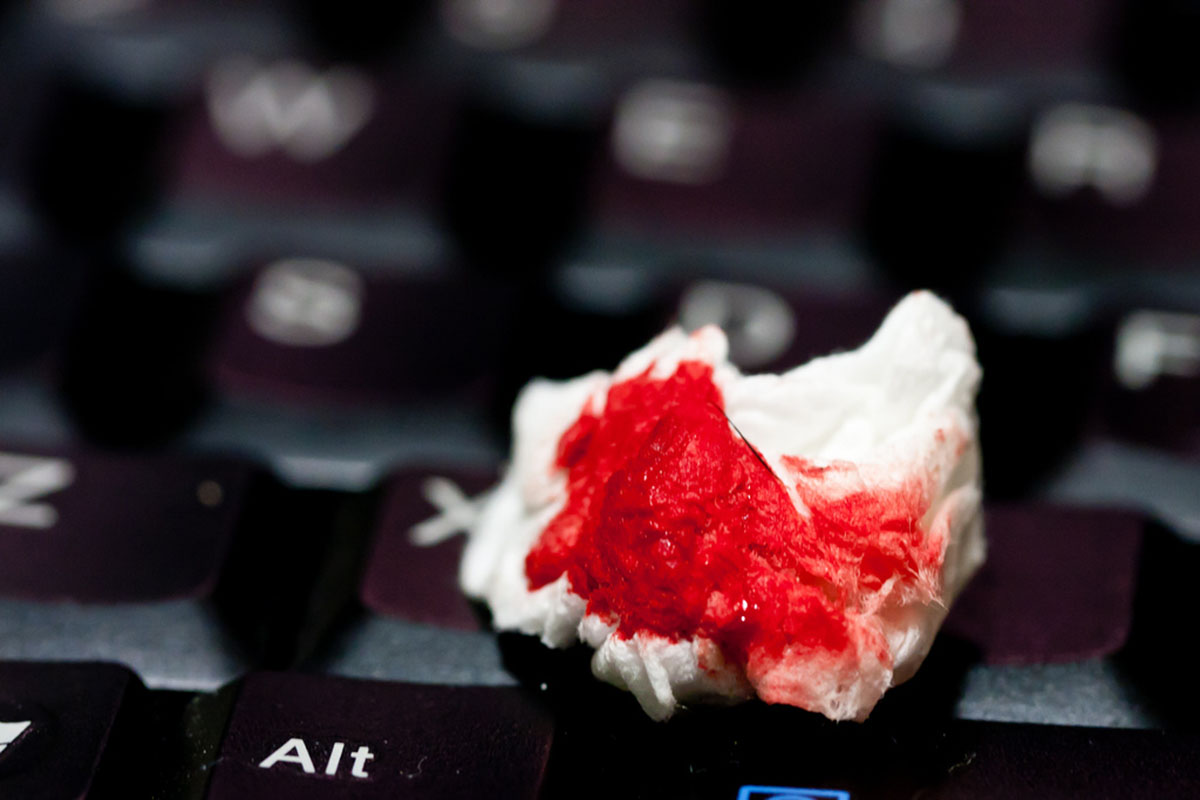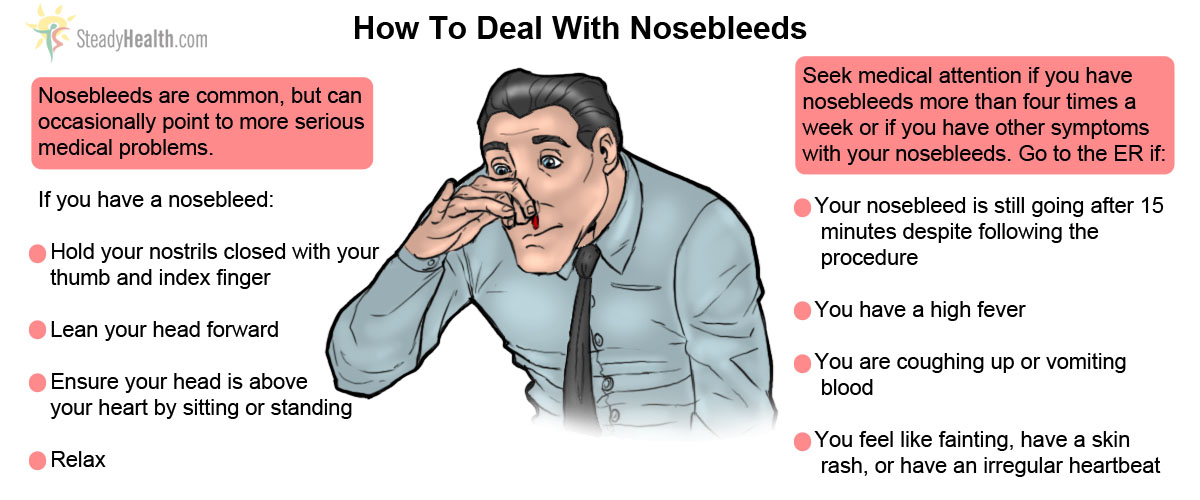Many people get nosebleeds occasionally. When this happens, you may be a little scared or you may simply wonder how to proceed. The nosebleed will usually pass within 10 to 15 minutes, after which most people will soon stop thinking about it. Though nosebleeds are rarely dangerous, there are some situations in which they deserve closer inspects and even require medical attention.
What should you do when you have a nosebleed? What causes nosebleeds? When should you be worried and seek medical attention?
What Are Nosebleeds?
The medical term for a nosebleed is epistaxis, and it happens when one or more blood vessels within the nose breaks. Nosebleeds are quite common especially in children and are not usually dangerous. The blood vessels in the nose are, after all, both fragile and close to the surface of your nasal lining.
Nosebleeds can be anterior or posterior. Anterior nosebleeds are usually less severe, but more visible since blood is expelled from the nose. Anterior nosebleeds involve more bleeding, but the source is much harder to uncover and the blood leaks into the throat. Nosebleeds are more frequently seen in children, elderly people, pregnant women, and people on blood thinning medication or with blood clotting disorders.
Low air humidity, diseases like the common cold and allergies, and nose picking are some of the more common harmless causes of nosebleeds. Having an "overdose" of fresh air or being at a high altitude can lead to nosebleeds, as can the use of certain medications including Aspirin, ibuprofen, nasal decongestants and antihistamines the same medications you might use to treat a blocked nose, a common cold, or allergies.
There will, occasionally, be more serious underlying causes. They can include structural problems within the nose, high blood pressure, polyps or tumors within the nose or sinuses, blood clotting disorders and abnormal nasal blood vessels. A fall or bump might lead to a nosebleed, and even a really heavy sneeze can be responsible.
There is a lot of contradictory advice about nosebleeds out there, so what should you really do when you or your child has a nosebleed?
Read More: Bleeding Gums - Causes, Symptoms, Treatment
The most important thing is to raise your head above your heart, which is easily achieved either by sitting or standing up. Do not, as many advise, hold your head back, as this can cause blood to leak into your throat and sinuses. Leaning your head forward a little is a better idea. Hold your nostrils closed with your thumb and index finger, and relax. Don't keep checking if the bleeding has stopped, and don't make sudden movements.
There are also certain preventative measures you can take. Don't blow your nose forcefully when you have a cold, an allergy like hay fever, or a blocked nose. Don't use nasal decongestants more frequently than you should, and stick to the instructions on your package insert. You can use an air humidifier if your nosebleeds are likely caused by central heating, and smokers with nosebleeds should definitely start thinking about kicking their habit.
When Do Nosebleeds Require Medical Attention?
A nosebleed every once in a while is not a reason to see your family doctor, if the nosebleed stops within around 15 minutes after following the instructions we gave. There are circumstances in which a nosebleed should worry you enough to seek medical attention, however. These can be divided into two categories: nosebleeds that require you to go to hospital, and nosebleeds that should lead you to see your family doctor.

In the meantime, for minor nosebleeds at home, you can do the following:
- Sit up straight and lean slightly forward to prevent blood from flowing down your throat.
- Pinch your nostrils together with your thumb and forefinger, and breathe through your mouth for 10-15 minutes to apply pressure and help stop the bleeding.
- Avoid tilting your head back, as it may cause blood to run down your throat and can lead to nausea or choking.
- Use a cold compress or ice pack to help constrict blood vessels and reduce bleeding.
When To Go To Hospital
Nosebleeds may occasionally last longer if you take the wrong approach to self-treatment. People who jump around while they have a nosebleed, and those who pick or blow their nose repeatedly can expect to prolong the bleeding. Those who follow all the instructions but are still bleeding after 15 minutes should seek medical attention however, particularly if the bleeding is heavy.
A stubborn nosebleed can be treated with a cauterizing procedure, which involves heat and silver nitrate, or with a gauze or sponge. Seeking emergency medical services is also recommended for people who have recurring nosebleeds within a short space of time.
Finally, look for immediate medical care if you have one or more of the following symptoms along with your nosebleed:
- Dizziness or feeling like fainting
- An irregular or rapid heart beat
- A high temperature above 101.4 degrees Fahrenheit or 38.5 degrees Celsius
- A skin rash
- Vomiting or coughing up blood
When To Make An Appointment With Your Family Doctor
Those who have frequently recurring nosebleeds more than four times a week should also see a doctor, but they can make an appointment with their family doctor rather than relying on emergency services. The same also holds true for children who have frequent nosebleeds.
Proud parents of frequent nose-pickers or kids who participate in lots of sports should see their child's pediatrician about nosebleeds too, but they don't need to go into all-out panic mode the cause of the nosebleeds is no great mystery, after all!
Underlying medical conditions may also be present if you have nosebleeds in combination with other symptoms. Call your doctor if you notice bleeding in other places as well, particularly in the stool or with urine, or if you bruise easily.
Read More: 11 Natural Products for Ideal Blood Circulation
People who have recently had chemotherapy treatment, those who know they have blot-clotting disorders, and those that are on blood-thinning drugs like Aspirin or warfarin should also give their doctor a call if they have nosebleeds. All of these factors are associated with more frequent nosebleeds, and your doctor will have advice on how to manage nosebleeds and reduce their frequency.
What Can You Expect When You See a Medical Professional about Nosebleeds?
Besides a physical examination of the nose and a chat about medical history and medication use, you might also need to undergo lab tests to determine blood loss or assess your blood's clotting abilities.
Immediate treatment for the nosebleed, if necessary, will be provided during the visit, and appropriate steps to stop the bleeding at home may be recommended for minor nosebleeds. The medical professional may also offer guidance on how to prevent future nosebleeds, such as avoiding certain triggers, using a humidifier, or applying a nasal lubricant.
In some cases, they may refer you to an ear, nose, and throat (ENT) specialist or another specialist for further evaluation and management if the nosebleeds are recurrent or related to a specific underlying condition. Throughout the visit, the doctor will provide educational materials about nosebleeds, self-care tips, and any specific instructions or precautions to follow.
- Mindmap by steadyhealth.com
- Photo courtesy of Jesse! S? by Flickr : www.flickr.com/photos/jesssseeee/5773681868/



Your thoughts on this